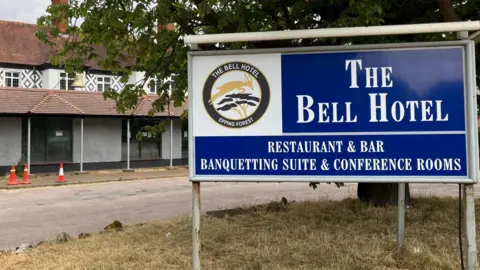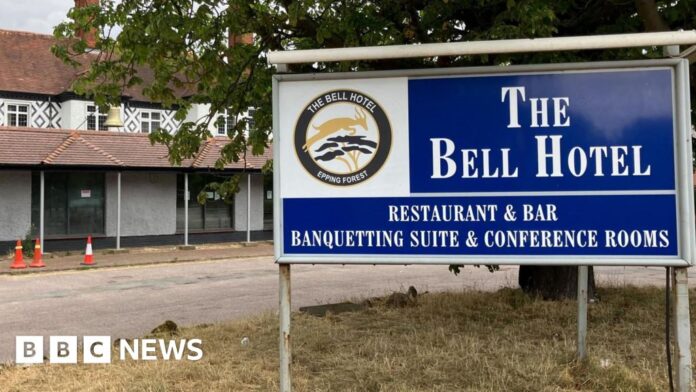BBC News, Essex
BBC Home and Legal Correspondent
 BBC
BBCA council has told the High Court that the continued use of a hotel to house asylum seekers was an “unacceptable” risk to public safety following violent protests.
Lawyers for Epping Forest District Council urged a judge earlier to grant an injunction against the owner of The Bell Hotel in Epping, Essex, to stop it from housing migrants on behalf of the Home Office.
Essex Police said at one point up to 2,000 people were demonstrating near the hotel and 16 people have been charged with offences relating to the disturbances.
Philip Coppel KC, representing the authority, said: “The protests have unfortunately been attended by violence and disorder.”
A High Court judge was expected to make a decision at the hearing on Friday.
The council lodged the application on Tuesday and asked that it take effect within 14 days in the event it was granted.
Mr Coppel added: “Epping Forest District Council comes to this court seeking an injunction because it has a very serious problem.”
“There has been what can be described as an increase in community tension, the catalyst of which has been the use of The Bell Hotel to place asylum seekers,” he said.
Somani Hotels, the owner of the premises, said the court should refuse the injunction and the action followed previous failed attempts by other councils to do the same in 2022.
 PA Media
PA MediaMr Coppel said that the defendant, Somani Hotels Limited, “did not advise or notify the local planning authority” to seek their views on the use of the site.
“It was not until two months later, when Epping Forest received a complaint about the use, that the matter came to the planning department’s attention,” he continued.
Action has been staged at the hotel since a man living there was charged with sexual assault, harassment and inciting a girl to engage in sexual activity.
Hadush Kebatu, 41, from Ethiopia, has denied the offences and remains on remand in custody.
The Home Office previously told the BBC: “It would be inappropriate to comment while legal proceedings are ongoing.”





